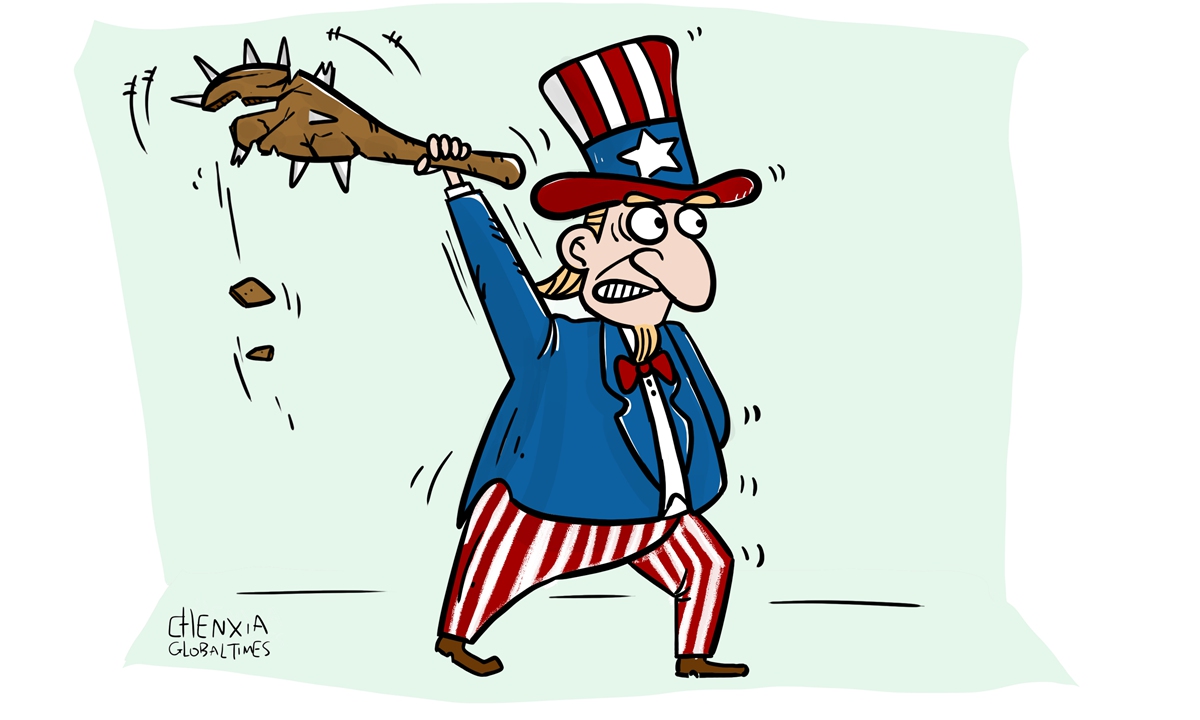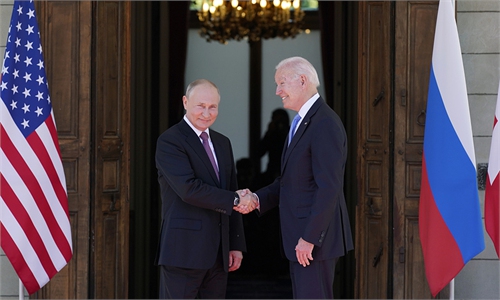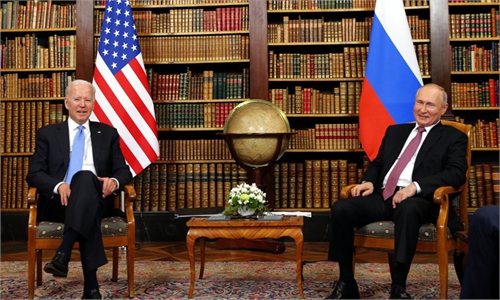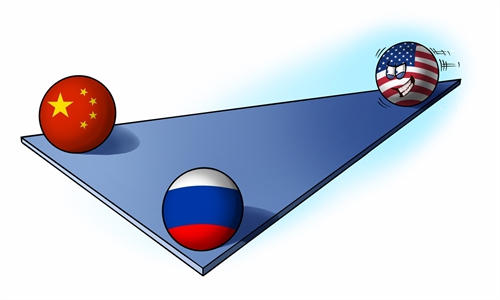COMMENTS / COLUMNISTS
US bid to alienate China, Europe, drive wedge between Beijing, Moscow is doomed

Illustration: Chen Xia/GT
US President Joe Biden completed a whirlwind diplomatic tour last week in Europe, desperate to repair relations with Germany, France, Italy and other European countries ruined at the hand of his predecessor Donald Trump, while telling Russian President Vladimir Putin in a summit closely watched by the world, that America is still at its peak, and Moscow shall not think about a disruption to the global world order.
The two communiques issued after the G7 and NATO meetings in which Biden both starred, highlighted a number of times China's economic, technological and military rise, which the US isn't feeling good and has determined to stymie China's growth by all means.
Biden, since his inauguration as US president in January, has vowed to do his utmost to maintain America's predominance in international affairs, and not to let China leap forward to surpass America in annual gross GDP during his tenure as US president.
Many US mainstream news organizations have analyzed, the motivation behind Biden's first in-person trip after the coronavirus struck the US is rallying European countries to counter China's meteoric rise in strength. In addition, Biden wants to establish some "redlines" for Moscow, as Washington is accustomed to dictating to other nations what to do, or not to do.
Biden aspires to alienate the economic partnership between Europe and China, as he has been obsessed with launching a fierce and repressive competition with China since he becoming president. He claimed many times that "America is back" during his latest trip to Europe.
But is America back for good or for more confrontations with the world's other two powers, China and Russia? Do European countries really want to follow Biden's heels and treat China, its largest trade partner, as an adversary, and make enemies with both Moscow and Beijing? European economies are generally weakened by the pandemic, and they need China's vast market and investment. Many believe that it will hurt Europe to have antagonistic relations with Beijing.
In the past several months, Biden repeatedly said the struggle of the age is "democracy versus autocracy", a narrative he carefully chose to disparage China. During the European trip, he implored partners to focus on China, even cajoling European allies to help the US counter China's rise, because in the eyes of many Washington politicians, China is just growing too rapidly and is a threat to America's long-standing global power.
However, what had happened during the tumult of last US presidential election, the siege of the US Congress on January 6 by the hardened Trump supporters, and the bloodletting across US cities in 2020 over race, police brutality and wealth chasm between haves and have-nots, has proven the US-style democracy is no longer the Western world's light beam. America is inherent with serious systemic flaws. Who can assure that Biden's presidency won't be sandwiched between the Trump era and the election of another America First flamboyant?
Top Biden administration officials have accused China of trying to build up a high-tech telecommunication network consisting of cellular networks, undersea cables and space assets that will give Beijing the ability to secretly monitor global communications. But, during the past many years, who has been the main culprit when it comes to eavesdropping other countries' leaders, including German Chancellor Angela Merkel?
It comes out that everything it accuses China of wanting to do, the US has already done, including spying on allies and using American tech companies to gather information.
And this time in the Geneva summit, Biden tried to drive a wedge between Russia and China. Biden told President Putin that Russian economy is "struggling", and Russia faces a long border with China at a time when Beijing is "hell-bent on domination". It is truly beyond any person's normal imagination for Biden to utter those words to Putin, which only reflects the US president's desperation to enlist friends and foes alike, in order to slow down China's rise.
Those words also point to the growing precariousness of America's hegemony, a role it has played since 1945 - that its influence could wane and America could one day become a normal global power like what the Dutch, the Spaniards and the Britons have witnessed. It is psychologically challenging, if not mind boggling, for Biden and other American politicians to reflect on what's to come.
It isn't easy to accept a predominant power's decline, but look what the US has done won't be much unfathomable.
In recent history, the US has accustomed to abusing other nations, big or small. It used its unrivalled military power to force other countries to have regime change, bomb other countries relentlessly, launch many devastating and illegal wars and leading to hundreds of thousands of civilian deaths, say, in Vietnam, Iraq, Libya, Afghanistan and former Yugoslavia. The US has applied its laws extraterritorially, and till today brutalizes other countries with all kinds of sanctions, including on China and Russia.
Ever since Putin became the Russian top leader in 1999, relationship between the two great neighbors of Russia and China has been improving, and took a giant leap in 2004 as the two countries settled all their border issues in a landmark boundary agreement. The two powers share nearly identical positions on the international stage, the two economies are complementary in structure, and in particular, the top leaderships in Beijing and Moscow are respecting and adoring each other, which sets the bedrock for the two to stand back-with-back.
The author is an editor with the Global Times. bizopinion@globaltimes.com.cn



